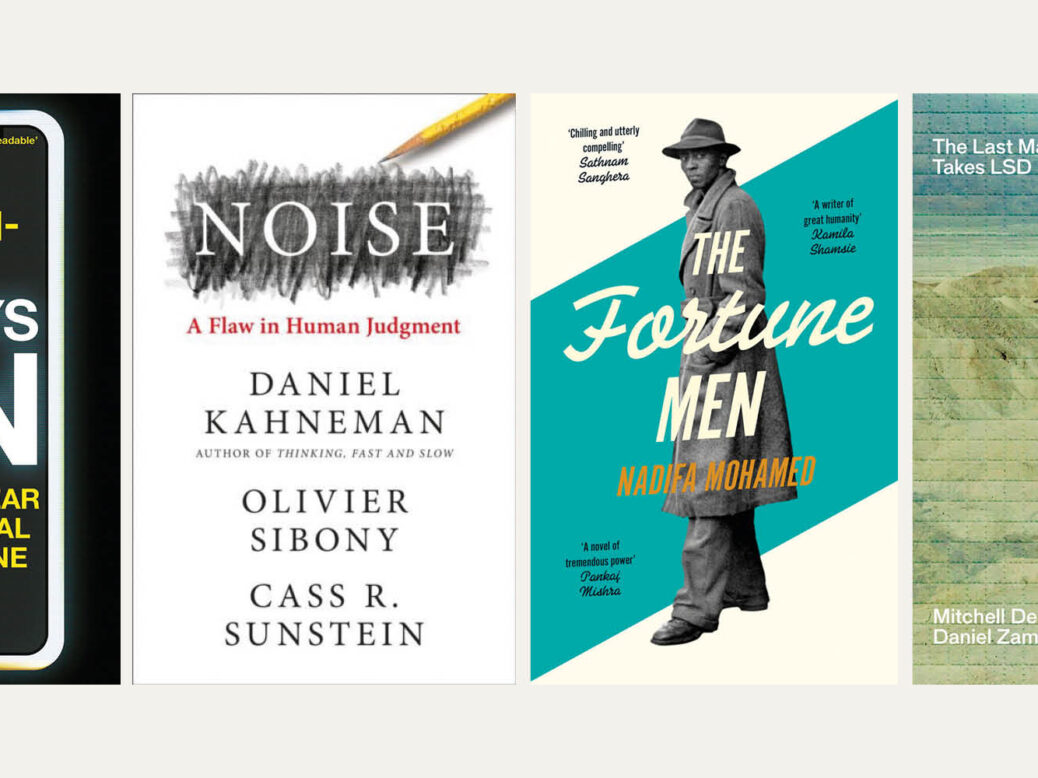
Noise by Daniel Kahneman, Olivier Sibony, Cass R Sunstein
In 2010 David Cameron declared that nudge theory – a concept laid out by the authors of Nudge, expanding on the work of the Nobel Prize-winning behavioural economist Daniel Kahneman – would transform British politics. Eleven years on, the former PM’s favourite thinkers have prepared a new book for him to chew over. Subtitled “A Flaw in Human Judgement”, it arrives about six years too late.
Here, Kahneman, Sibony and Sunstein study “noise”, which they define as “unwanted variability in judgements”. If bias is systematic, noise is random – inconsistent, irrational decision-making that produces bad results. Judges’ verdicts vary depending on the weather; underwriters looking at the same sample cases arrive at wildly different premium rates. There’s even, for Cameron, a bit on the perils of subjective confidence in one’s own judgements. The message? Humans make mistakes; we’re clouded by mood, psychology, circumstance. Statistically, algorithms make better decisions. So I can say I didn’t much enjoy this book – I found it overly long and repetitive – and know that this is just my imperfect judgement.
By Katherine Cowles
HarperCollins, 464pp, £25
[See also: Reviewed in short: New books by Margaret Reynolds, Michio Kaku, AK Blakemore and Jay Griffiths]
The Last Man Takes LSD by Mitchell Dean and Daniel Zamora
It was at Zabriskie Point in Death Valley, California, deep within the desert and beside the remains of a dried up lake, that Michel Foucault had what he claimed was “the greatest experience of his life”. There, in May 1975, the philosopher, at the behest of his boyfriend Michael Stoneman and the historian Simeon Wade, popped a tab of LSD. Foucault, chair in the “history of systems of thought” at the Collège de France, and the author of The History of Madness (1961) and The Order of Things (1966), was arguably the last great French intellectual of the 20th century. But as Dean and Zamora show in their compelling new book, Foucault’s acid trip would radically alter the direction of his research in the following years. More specifically, it led Foucault to engage with neoliberalism as a form of statecraft.
This book is thus not just a brilliant and well-timed exploration of Foucault’s intellectual trajectory (Foucault has become a subject of intense contestation having been drawn into the risible Anglo-American “culture wars”), but it is also a necessary addition to the literature that has emerged over the past five years on the intellectual history of neoliberalism.
By Gavin Jacobson
Verso, 256pp, £17.99
[See also: Mussolini and the rise of fascism]
The Fortune Men by Nadifa Mohamed
The Fortune Men, the third novel by British-Somali author Nadifa Mohamed, is a dark tale. Based on the true story of Mahmood Mattan, a Somali sailor wrongfully accused of murder in Cardiff in 1952, the novel depicts a world in which racism and prejudice are normal, even trivial, including to those subjected to them. We know from the outset that the man responsible for the shopkeeper’s death is not Mahmood, yet the odds – and he is a betting man – seem stacked against him at every juncture.
Mohamed’s prose does not always capture the gravity of the situation: there are too many anachronisms (“twenty degrees centigrade”) and clunky metaphors (“Laura’s small island of a body”) for the reader to feel completely absorbed, and there is too much wistful context for us to be fully invested in the characters. But her depiction of a diverse 1950s Cardiff is evocative and enlightening: “the splash of tyre on wet tarmac, the stink of sesame oil and broiling meat from Sam On Wen’s Chinese restaurant, the tinny clatter of calypso from a record player”. And as Mahmood becomes more desperate, with only Allah providing comfort, the message rings clear: “There is no right or wrong answer, just… the truth.”
By Emily Bootle
Viking, 384pp, £14.99
[See also: Hadley Freeman’s House of Glass: a moving memoir told through clothes]
Always On by Rory Cellan-Jones
It’s hard to think of anyone more active online than Rory Cellan-Jones, the BBC’s 63-year-old technology correspondent, who spends 18 hours a day tweeting, blogging and posting. He says this is
all thanks to the smartphone, his fascination with which has led him to dedicate a whole book to its impact. He aims to tell the story of Britain’s digital footprint since the unveiling of the first iPhone, up to and including our use of technology during
the pandemic.
Cellan-Jones is passionate about technology and fascinated with how it has developed in the past decade, and understands how to make highly technical details accessible to the average reader. He includes vignettes about his personal experiences, such as interviewing Stephen Hawking about the future of artificial intelligence and reporting on the launch of the UK’s first 5G network (though the relevance of these stories to the book’s wider narrative is sometimes unclear). However, despite
Cellan-Jones’s engaging style and visible enthusiasm, Always On fails in parts to create the coherent smartphone story that it promises, and instead becomes a lopsided report on the different ways Britons use personal tech today.
By Sarah Manavis
Bloomsbury, 304pp, £18.99
This article appears in the 02 Jun 2021 issue of the New Statesman, Return of the West






